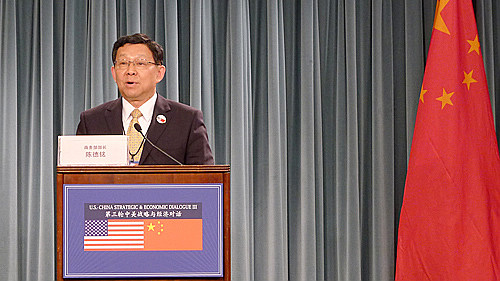|
 |
|
DELIVERING SPEECH: Chinese Commerce Minister Chen Deming speaks during a briefing on the sideline of the third China-U.S. Strategic and Economic Dialogue held in Washington, D.C. on May 9 (CHEN WEN) |
Some Chinese companies complain that the Committee on Foreign Investment in the United States (CFIUS) does not carry out security reviews on Chinese investment in the United States in a transparent or fair manner, said Chinese Commerce Minister Chen Deming.
The unfair treatment, which includes the rejection of several Chinese companies' attempt to invest in the U.S. market, has led to a very limited portion of investment outflows from China to the United States, Chen said at a briefing on the sidelines of the third China-U.S. Strategic and Economic Dialogue (S&ED) held in Washington, D.C. on May 9.
Excluding investment in the financial sector, China's total outbound direct investment stood at $59 billion last year, but only 2.4 percent of which went to the United States, according to Chen.
"I admit that national security is important to any country," Chen said. But he pointed out that the process of national security review should be carried out in a more transparent way. "We hope that the United States will treat Chinese investments and investments made by Chinese state-owned enterprises in the United States in a fair manner," said Chen.
Chen told reporters that representatives from both China and the United States talked about ways to improve investment climates of both countries during the first session of economic talks. He said that China's complaints largely revolved around the lack of transparency in the CFIUS' national security review. The CFIUS is an inter-agency committee that reviews the national security implications of foreign investments in U.S. companies and operations. U.S. officials put more emphasis on the national treatment of U.S. companies in China and the protection of intellectual property rights.
The key to improving and creating favorable investment climate for companies from both countries is for the two sides to negotiate a bilateral investment treaty to protect companies' investments, said Chen. "I hope that both countries proceed from their own national conditions and demonstrate flexibility," he added.
According to Chen, issues like promoting more balanced trade, exploring new areas of cooperation and intensifying cooperation in the multilateral arena, were also discussed during the first session of economic talks, while the much debated the yuan exchange rate issue was not covered.
Chen said that from the perspective of trade, the concerns or worries of the West over the yuan exchange rate are "not grounded," because China has been witnessing a continued decline in its trade surplus over the past three years.
China's trade surplus was around $180 billion last year, 99 percent of which came from its trade with the United States, Chen said. The current imbalances between China and the United States resulted from multiple reasons. The resolution to these imbalances is "to ease the U.S. export control regime toward China and to encourage U.S. export to China rather than restricting Chinese exports to the United States," he said.
(Reporting from Washington, D.C.) | 